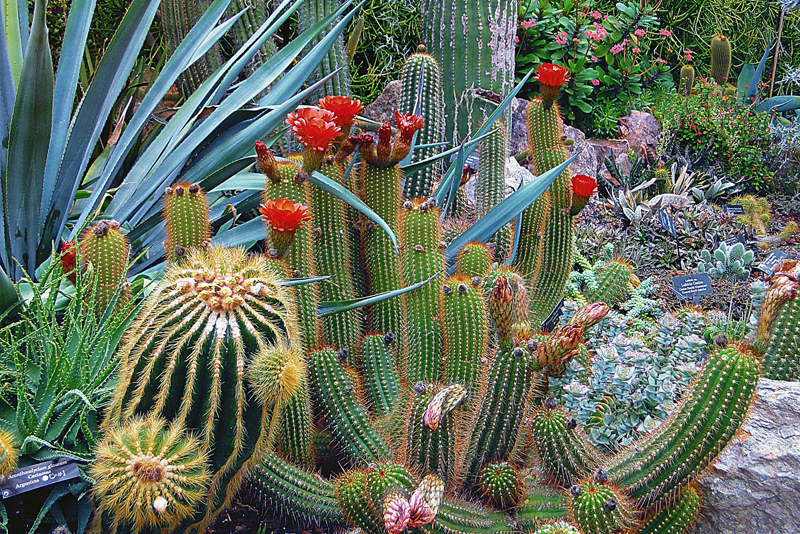Some Newer Varieties of Hardy Spurges

Of all the hardy perennials, the spurges outshine the others. Here are some newer varieties that should become very popular. These can be used both as garden plants and container plants.
Glacier Blue Euphorbia characias is one of the outstanding new ones. Hardy to zone seven, this evergreen grows to nearly 1½ feet tall with a slightly larger spread. This is noted for the cream colored edges on the blue-green leaves. The bracts and flowers are also cream colored. The plant also has grayish-blue stripes. The flower stalks are borne well above the foliage. This variety typically blooms during late winter through the spring. It is great for flower beds, mixed borders, and rock gardens.
Blackbird euphorbia is considered one of the most sensational newer spurges. This evergreen perennial is hardy to zone seven. With a rounded, bushy growth habit, Blackbird reaches 1½ feet tall with a slightly larger width. When the plant is grown in full sun, the leaves assume a very dark blackish tone for which the plant is named. Though this plant will grow well enough in partial shade, the color won’t be quite as good. Blackbird blooms from mid to late spring, producing lots of colorful, greenish-yellow flowers and bracts.
Shorty euphorbia is a well shaped, compact, vigorous perennial with a mounding growth habit. It is winter hardy to zone seven. Shorty can reach 1¼ to 1½ feet tall with a slightly smaller spread. This variety has attractive greenish-blue leaves that have red at the very tips when they first emerge. During the spring, Shorty brings vivid yellow blooms.
Rudolph euphorbia (Euphorbia x martini) is a hybrid that is named for its gorgeous winter color. During the colder months, this evergreen has upper foliage that blushes with vivid red. Later during the spring, Rudolph has attractive, greenish-yellow blooms that have red in the center. Rudolph can reach about two feet tall and wide. This is hardy to zone six.
All of these hardy spurges need a rich, quick draining soil. Sandy ones are particularly suitable. Though they can tolerate partial shade, they are also suited to full sun. These do well in container gardens.
Glacier Blue Euphorbia characias is one of the outstanding new ones. Hardy to zone seven, this evergreen grows to nearly 1½ feet tall with a slightly larger spread. This is noted for the cream colored edges on the blue-green leaves. The bracts and flowers are also cream colored. The plant also has grayish-blue stripes. The flower stalks are borne well above the foliage. This variety typically blooms during late winter through the spring. It is great for flower beds, mixed borders, and rock gardens.
Blackbird euphorbia is considered one of the most sensational newer spurges. This evergreen perennial is hardy to zone seven. With a rounded, bushy growth habit, Blackbird reaches 1½ feet tall with a slightly larger width. When the plant is grown in full sun, the leaves assume a very dark blackish tone for which the plant is named. Though this plant will grow well enough in partial shade, the color won’t be quite as good. Blackbird blooms from mid to late spring, producing lots of colorful, greenish-yellow flowers and bracts.
Shorty euphorbia is a well shaped, compact, vigorous perennial with a mounding growth habit. It is winter hardy to zone seven. Shorty can reach 1¼ to 1½ feet tall with a slightly smaller spread. This variety has attractive greenish-blue leaves that have red at the very tips when they first emerge. During the spring, Shorty brings vivid yellow blooms.
Rudolph euphorbia (Euphorbia x martini) is a hybrid that is named for its gorgeous winter color. During the colder months, this evergreen has upper foliage that blushes with vivid red. Later during the spring, Rudolph has attractive, greenish-yellow blooms that have red in the center. Rudolph can reach about two feet tall and wide. This is hardy to zone six.
All of these hardy spurges need a rich, quick draining soil. Sandy ones are particularly suitable. Though they can tolerate partial shade, they are also suited to full sun. These do well in container gardens.
This site needs an editor - click to learn more!

Related Articles
Editor's Picks Articles
Top Ten Articles
Previous Features
Site Map
Content copyright © 2023 by Connie Krochmal . All rights reserved.
This content was written by Connie Krochmal . If you wish to use this content in any manner, you need written permission. Contact
BellaOnline Administration
for details.


